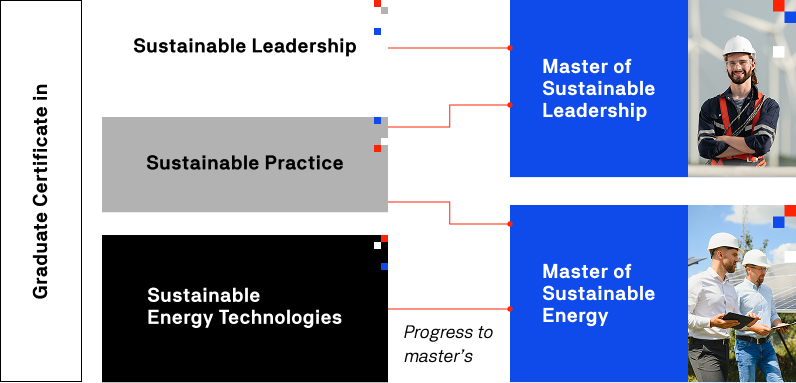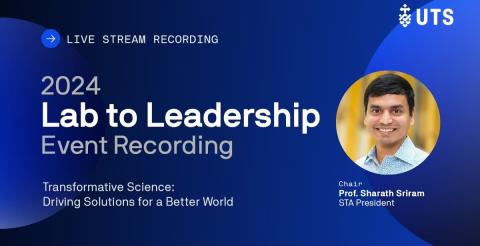Why study the Master of Sustainable Leadership with UTS Online?
Top 100 University Globally2
Top 20 global university for advancing sustainable development1
Become a catalyst for change and pave the way for a more sustainable future
Unifying science and leadership for ethical, accurate and reliable decision-making
1Times Higher Education Impact Ranking. 2QS World University Rankings, 2026.
Embrace the sustainable revolution
Our journey towards a sustainable tomorrow is gaining momentum. We possess the power of science, data, technology and consumer demand.
Now, more than ever, we need visionary leaders who can guide us. We need strategic trailblazers who can inspire and motivate others to join the quest for sustainable transformation and empower them to act through policy and best practices.
Develop your leadership skills to drive change towards a sustainable future with the UTS Online Master of Sustainable Leadership and not only future-proof your career but also contribute to the planet's well-being.
Who is this course for?
The Master of Sustainable Leadership is designed for professionals from any industry or background who want to lead transformative change and drive sustainability at a strategic level.
Whether you work in business, government, health, education, engineering or the not-for-profit sector, this course is for those ready to influence sustainable practices, shape organisational strategy and create long-term impact across industries and communities.
If you’re ready to step beyond operational responsibility and lead sustainable transformation, this course will equip you with the vision, skills and leadership strategies to deliver meaningful, lasting change.
This course is suited to professionals from a broad range of qualifications and experience, which may include:
- Engineers and technical specialists looking to lead sustainable infrastructure, energy or environmental projects.
- Scientists and researchers wanting to apply sustainability leadership to complex environmental and social challenges.
- Policy makers and planners working to design and implement sustainability strategies across government and industry.
- Health and social care leaders aiming to embed sustainability into community programs and organisational operations.
- STEM professionals seeking to move into strategic leadership roles that champion sustainable innovation and systems change.
See entry requirements under course information for eligibility information.
What you will study
The UTS Online Master of Sustainable Leadership comprises 12 online subjects (72 credit points (CP) in total).
Complete all of the following subjects:
- Shaping Policies for the Future
- Science of Climate Change for Leaders
- Sustainability Practices in Industry
- Science and Big Data
- Innovations in Energy
- Leading People and Change
- High Performance Science Leadership
- Communicating Science and Vision
- Leadership in Action
Note: Most UTS Online subjects are valued at 6 credit points each. For detailed subject descriptions and further information, please download a course guide.
Flexible course options
The Master of Sustainable Leadership comprises 12 online subjects (72 credit points (CP) in total).
Students who complete the Graduate Certificate in Sustainable Leadership or the Graduate Certificate in Sustainable Practice may qualify to advance to the Master of Sustainable Leadership, requiring only 5 additional subjects to complete the master's degree.
Graduate Certificate
4 Subjects | 8 months (minimum)
Or continue studying
Master's
+5 Subjects | 24 months
Graduate with a Master's degree
Not sure which path is right for you? Our Student Enrolment Advisors are here to help, offering detailed information, alternative pathways, and tailored guidance to support your decision.
Study pathways
The Faculty of Science offers 3 online Graduate Certificate courses to support your career in sustainability.
The Graduate Certificate in Sustainable Leadership leads to the Master of Sustainable Leadership, the Graduate Certificate in Sustainable Energy Technologies leads to the Master of Sustainable Energy, and the Graduate Certificate in Sustainable Practice provides a flexible pathway into either master's degree.
This allows you to tailor your studies to align with your career goals and develop specialist skills in the areas of sustainability that matter most to you.
Learning outcomes
Drive sustainable innovation and energy solutions
Critically assess emerging energy technologies and sustainability practices. Justify their benefits and limitations to lead informed, impactful decision-making in the transition to a more sustainable future.
Shape policy for health, equity and environmental impact
Evaluate the role of public policy in driving sustainable outcomes. Analyse its effects on health, social equity and environmental resilience to influence and implement meaningful change.
Lead with influence through communication and collaboration
Develop advanced communication and relational leadership skills to engage stakeholders effectively. Foster collaboration, model empowering communication strategies and lead teams with confidence.
Accelerate your career as a sustainability leader
Refine your leadership identity by building self-awareness, strategic decision-making and future-focused skills. Develop a professional roadmap for career progression, industry impact and long-term success.
Course information
Entry requirements
Applicants must have one of the following:
- Completed Australian bachelor's degree or higher qualification, or overseas equivalent
OR
- Completed one of the following UTS qualifications:
Eligibility for admission does not guarantee an offer of a place.
Want to check your eligibility?
Not only do we have the right tools and support teams to help you – we have people who care about your success.
Career outcomes
The UTS Online Master of Sustainable Leadership empowers professionals to lead transformative change in organisations and communities, fostering sustainability and ethical practices. This course equips you with the knowledge and leadership skills to create positive environmental, social and economic outcomes.
Upon completion, graduates can pursue roles such as:
- Sustainability Manager
- Corporate Social Responsibility (CSR) Advisor
- Environmental Policy Consultant
- Organisational Change Leader
- Sustainable Development Manager
$120,000 Average
salary
Sustainability Consultants in Australia earn an average annual salary of $120,000, showcasing the financial benefits of expertise in sustainable practices.
(Talent.com)
A national commitment to net zero
Australia’s target of reaching net-zero emissions by 2050 is accelerating investment in renewable energy and sustainable innovation, with over $20 billion committed to funding initiatives that support the transition.
(Australian Government)
56%
of CEOs prioritise
sustainability
A global survey found that 56% of CEOs consider sustainability a key factor in driving business growth, highlighting the demand for leaders with expertise in sustainable practices.
(KPMG)
Upcoming intakes
UTS Online courses have 6 intakes per year. The diagram below shows all upcoming intakes. Our next intake is highlighted below.
-
Jan
2026 -
Mar
2026 -
May
2026 -
Jul
2026 -
Aug
2026 -
Oct
2026
Meet our Course Director
"Our graduates will become leaders who define the future and shape policies for the benefit of all. They will develop advanced capabilities to lead with confidence in government, the community and industry."
Dr. Parvez Mahmud
Senior Lecturer, School of Mathematical and Physical Sciences;
Program Director, Master of Sustainable Energy and Master of Sustainable Leadership
Download a course guide
Download a course guide to explore detailed subject descriptions, entry requirements, pathway options and fee information.
Frequently asked questions
The Master of Sustainable Leadership equips you with the knowledge and skills to excel in leadership roles within sustainable organisations and industries. You'll gain expertise in sustainability principles, leadership strategies and ethical decision-making frameworks. The program emphasises real-world applications, empowering you to tackle complex sustainability challenges, drive positive organisational change and build a strong professional network to advance your career in the rapidly evolving sustainability sector.
To be eligible for the Master of Sustainable Leadership, you must meet one of the following entry requirements:
- A recognised Australian bachelor’s degree or higher qualification or an equivalent international institution, demonstrating that you’ve completed undergraduate-level study; OR
- Completion of a related UTS qualification, such as a Graduate Certificate in Sustainable Practice or Graduate Certificate in Sustainable Energy Technologies, which can serve as a pathway into the Master’s degree.
This means the course is open to professionals from various academic and professional backgrounds. You don’t have to come from a sustainability-specific discipline to apply, as long as you have a recognised qualification that demonstrates your ability to undertake postgraduate study.
Prospective students are assessed on their academic profile, and meeting the minimum entry criteria does not guarantee an offer. Selection considers your qualifications and readiness for advanced study.
Yes, the Master of Sustainable Leadership is designed for working professionals. Delivered entirely online, it offers flexible learning options that allow you to balance your work and studies. With access to asynchronous course materials and discussions, you can engage with the program at your own pace and schedule, making it manageable alongside full-time employment.
At UTS Online, your success is our priority, and that doesn't change when you study remotely. We're committed to providing you with a comprehensive range of student support services, guiding you from enrolment right through to graduation.
As a UTS student, you'll enjoy access to an array of support services, including:
-
Your own dedicated Student Success Advisor, available to answer any course-related questions you may have to keep you on track
-
UTS Career Hub for work experience and networking opportunities
-
Assignment writing and academic support from teachers & lecturers
-
Public speaking and peer learning support
-
Confidential medical and mental health services.
Connect with us to learn more about how we support your success while studying for a Master of Sustainable Leadership at UTS Online.
You will be supported throughout your online studies, and provided with multiple opportunities to receive feedback from teaching staff and peers in online discussions and interactive activities.
Assignments in our subjects are authentic, relevant and often grounded in your personal clinical context. They vary according to the subject and include, but are not limited to clinical reports, posters, online quizzes and vivas (oral assessment), podcasts, recorded presentations, education tools, proposals, protocols and professional portfolios. You will not be required to complete exams or group assignments to graduate the Master of Sustainable Leadership.
When studying the Master of Sustainable Leadership, your online study experience includes:
-
Tools for exploring sustainability strategies and ethical leadership
-
Practical resources for real-world application in your industry
-
Peer collaboration and academic support
Here’s a video example showcasing key features of our online learning platform, including tools designed to enhance your study experience.
For practical tips on balancing your studies with work and life, click here to learn how to achieve your goals. Remember, our team is just an email or call away to support you every step of the way.













